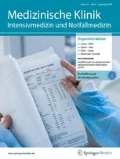Zusammenfassung
Die Arzneimitteltherapie im Alter muss an die Gegebenheiten des alternden Organismus angepasst werden. Zahlreiche Pharmaka aus verschiedensten Substanzklassen (u. a. Antibiotika, niedermolekulare Heparine) müssen in ihrer Dosierung an das Alter bzw. die im Alter nachlassende Nierenfunktion angepasst werden. Alte Menschen reagieren aufgrund der physiologischen Veränderungen stärker auf Medikamente, welche die renale Funktion beinträchtigen können: Diuretika, nichtsteroidale Antirheumatika, Hemmstoffe des Renin-Angiotensin-Aldosteron-Systems und Kontrastmittel. Auch die Auswahl der Pharmaka muss auf ihre Verträglichkeit hin überprüft werden, so sollten sturzgefährdende Medikamente oder solche mit starken anticholinergen Nebenwirkungen vermieden werden. Analgetika, Sedativa und Narkotika sollten altersangepasst ausgewählt und dosiert werden.
Die Multimorbidität im Alter bedingt oft eine Polypharmazie, die nicht selten die Ursache für eine stationäre Aufnahme darstellt. Hier gilt es, die bestehende Medikation auf ihre akute Notwendigkeit hin zu überprüfen und gegebenenfalls zu reduzieren.
Abstract
Drug therapy in seniors needs to be adapted to the capacity of the aged organism. The dosages of a high number of drugs from several classes (e.g., antibiotics, low molecular weight heparins) have to be modified according to age or reduced renal function, which is a common feature in old age. Moreover, elderly patients due to their physiological alterations exhibit an increased response to drugs having an influence on renal function: diuretics, nonsteroidal anti-inflammatory drugs, inhibitors of the renin–angiotensin–aldosterone system, and contrast media. The choice of drugs should consider their age-specific tolerability, i.e., fall-risk increasing drugs and those with strong anticholinergic side effects should be avoided. Analgesics, sedatives, and narcotics have to be selected according to the age of the patient and dosages should be adapted.
Multimorbidity is often treated with polypharmacy, whereby it is not unusual that this is the cause for acute hospital admission. The necessity of all drugs prescribed has to be scrutinized and the drug burden should be reduced as clinically required.

Literatur
Berthold HK, Steinhagen-Thiessen E (2009) Arzneimitteltherapie im Alter. Wo liegen die Probleme? Was soll man tun, was muss man lassen? Internist 50:1415–1424
Chronopoulos A, Rosner MH, Cruz DN, Ronco C (2010) Acute kidney injury in elderly intensive care patients: a review. Intensive Care Med 36:1454–1464
Cicerchia M, Ceci M, Locatelli C et al (2010) Geriatric syndromes in peri-operative elderly cancer patients. Surg Oncol 19:131–139
Harenberg J, Bauersachs R, Diehm C et al (2010) Antikoagulation im Alter. Internist 51:1446–1455
Holt S, Schmiedl S, Thürmann PA (2010) Potentially inappropriate medication in the elderly – PRISCUS list. Dtsch Arztebl Int 107:543–551
Howard RL, Avery AJ, Slavenburg S et al (2006) Which drugs cause preventable admissions to hospital? A systematic review. Br J Clin Pharmacol 63:136–147
Kämmerer W (2011) Klinisch relevante pharmakokinetische Arzneimittelinteraktionen in der Intensivmedizin. Eine Übersicht. Intensivmed 48:480–492. doi:10.1007/s00063-011-0286-6
Leipzig RM, Cumming RG, Tinetti ME (1999a) Drugs and falls in older people: a systematic review and meta-analysis: 1. Psychotropic drugs. J Am Geriatr Soc 47:30–39
Leipzig RM, Cumming RG, Tinetti ME (1999b) Drugs and falls in older people: a systematic review and meta-analysis: 2. Cardiac and analgesic drugs. J Am Geriatr Soc 47:40–50
Manesse CK, Derkx FHM, De Ridder MAJ et al (2000) Contribution of adverse drug reactions to hospital admission of older patients. Age Ageing 29:35–39
Onder G, Pedone C, Landi F et al (2002) Adverse drug reactions as cause of hospital admissions: results from the Italian group of pharmacoepidemiology in the elderly (GIFA). J Am Geriatr Soc 50:1962–1968
Pittrow D, Krappweis J, Kirch W (2002) Arzneimittelanwendung bei Alten- und Pflegeheimbewohnern im Vergleich zu Patienten in ambulanter Pflege bzw. ohne Pflegebedarf. Dtsch Med Wochenschr 127:1995–2000
Schiemann A, Spies C (2011) Analgesie, Sedierung und Delir in der Intensivmedizin. Intensivmed 48:135–158
Schmid H, Schiffl H, Lederer SR (2011) Die akute Nierenschädigung. Intensivmed 48: 468–473. doi:10.1007/s00063-011-0270-1
Schmiedl S, Szymanski J, Rottenkolber M et al (2007) Fingerhut – ein alter Hut? Eine Analyse stationärer Aufnahmen durch digitalisassoziierte unerwünschte Arzneimittelwirkungen. Med Klin 102:603–611
Schneeweiss S, Hasford J, Göttler M et al (2002) Admissions caused by adverse drug events to internal medicine and emergency departments in hospitals: a longitudinal population-based study. Eur J Clin Pharmacol 58:285–291
Shi S, Mörike K, Klotz U (2008) The clinical implications of ageing for rational drug therapy. Eur J Clin Pharmacol 64:183–199
Spruill WJ, Wade WE, Cobb HH (2008) Comparison of estimated glomerular filtration rate with estimated creatinine clearance in the dosing of drugs requiring adjustments in elderly patients with declining renal function. Am J Geriatr Pharmacother 6:153–160
Statistisches Bundesamt (2009) Bevölkerung Deutschlands bis 2060, 12. koordinierte Bevölkerungsvorausberechnung. http://www.destatis.de/jetspeed/portal/cms/Sites/destatis/Internet/DE/Presse/pk/2009/Bevoelkerung/Statement__Egeler__PDF, property = file.pdf letzter. Zugegriffen am 14. August 2011
Thürmann PA, Werner U, Hanke F et al (2007) Arzneimittelrisiken bei hochbetagten Patienten: Ergebnisse deutscher Studien. In: Bundesärztekammer (Hrsg) Fortschritt und Fortbildung in der Medizin, Bd 31. Berlin, S 216–224
Thürmann PA (2009) Pharmakotherapie im Alter. In: Stoppe G, Mann E (Hrsg) Geriatrie für Hausärzte. Hans Huber, Bern, S 255–268
Thürmann PA (2010) Spezielle klinisch-pharmakologische Aspekte bei der Therapie. In: Weihrauch TR (Hrsg) Wolff – Weihrauch. Internistische Therapie 2010–2011. Urban Fischer, München, S 263–279
Thürmann PA, Holt S, Szymanski J et al (2011) Potentially inappropriate medication, polypharmacy and drug-related problems in a german elderly cohort. Basic Clin Pharmacol Toxicol 109(Suppl 1):28 (Abstr. O18)
Turnheim K (2003) When drug therapy gets old: pharmacokinetics and pharmacodynamics in the elderly. Exp Gerontol 38:843–853
Vass M, Hendriksen C (2005) Polypharmacy and older people: the GP perspective. Z Gerontol Geriatr 38(Suppl 1):I14–I17
Zhang M, Holman CDJ, Preen DB, Brameld K (2006) Repeat adverse drug reactions causing hospitalization in older Australians: a population-based longitudinal study 1980–2003. Br J Clin Pharmacol 63:163–170
Interessenkonflikt
Die korrespondierende Autorin weist auf folgende Beziehungen hin: P. A. Thürmann erhielt ein Vortragshonorar von Rottapharm Madaus GmbH. S. Schmiedl erhält Vortragshonorare für Fortbildungen in geriatrischer Pharmazie von GeroPharmCare GmbH.
Author information
Authors and Affiliations
Corresponding author
Rights and permissions
About this article
Cite this article
Thürmann, P., Schmiedl, S. Pharmakotherapie alter Patienten. Med Klin 106, 16–23 (2011). https://doi.org/10.1007/s00063-011-0041-6
Received:
Accepted:
Published:
Issue Date:
DOI: https://doi.org/10.1007/s00063-011-0041-6

